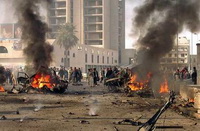Bombing in Iraq: More Than 150 People Killed
According to the Iraqi Government, two massive suicide bomb attacks last night aimed at preventing the country from holding elections in January.

Two cars exploded minutes apart during the morning rush hour as workers arrived at the Justice Ministry and Baghdad's Provincial Government headquarters.
The confirmed death toll from the bombs has risen to more than 130, making it the worst attack since 2007, ABC News reports.
It was also reported, Sunday's bombings, near the Justice Ministry and the Baghdad provincial government building, ripping through cars and people, was the bloodiest in Iraqi capital since mid-2007.
World leaders condemned the attacks and Iraqi officials pointed a finger at al Qaeda and remnants of former dictator Saddam Hussein's government. Opposition politicians blamed the security forces.
Iraq is trying to rebuild its economy and society after decades of repression, war and economic ruin. Security has remained elusive since the U.S.-led invasion in 2003 and subsequent sectarian slaughter.
U.S. troops have begun pulling out in advance of a full withdrawal by the end of 2011, and ensuring security is now mainly the responsibility of Iraqi soldiers and police, The Washington Post reports.
Meanwhile, United Nations Secretary-General Ban Ki-moon urged Iraqis to unite against the attacks and “work with heightened urgency to protect Iraq’s political progress” so that the national elections can take place as scheduled on Jan. 16. Iraqi lawmakers have been unable to agree on an election law necessary to stage the parliamentary ballot.
Iraq has suffered a surge in attacks this year focused on government offices, security forces, the majority Muslim Shiite population and the Kurdish-dominated northern cities of Mosul and Kirkuk. The growing violence comes as U.S. President Barack Obama is reducing troop levels in Iraq as he redirects U.S. efforts on Afghanistan.
“This is horrible news for Obama, who wants to have less importance for Iraq in foreign policy and focus more on Afghanistan,” Alex Vatanka, senior Middle East analyst at Englewood, Colorado-based IHS Jane’s, a defense research group, said in a telephone interview. “Iraq is reappearing as a significant factor, complicating hugely his entire foreign policy,” Bloomberg reports.
Subscribe to Pravda.Ru Telegram channel, Facebook, RSS!




